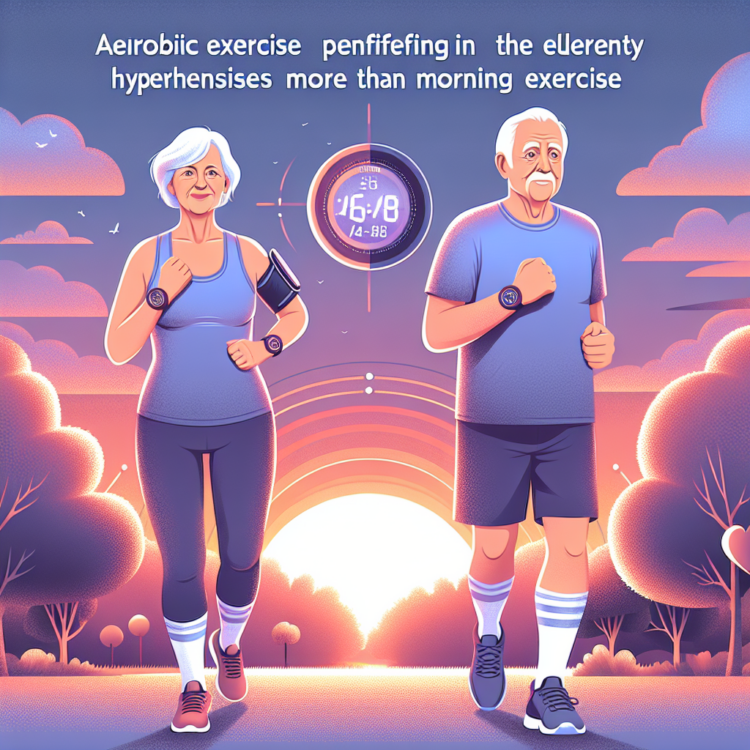Aerobic training is known to regulate blood pressure more effectively when practiced in the evening than in the morning. Researchers who conducted a study of elderly patients at the University of São Paulo’s School of Physical Education and Sports (EEFE-USP) in Brazil concluded that evening exercise is better for blood pressure regulation thanks to improved cardiovascular control by the autonomic nervous system via a mechanism known as baroreflex sensitivity. An article on the study is published in The Journal of Physiology.
Aerobic training is known to regulate blood pressure more effectively when practiced in the evening than in the morning. Researchers who conducted a study of elderly patients at the University of São Paulo’s School of Physical Education and Sports (EEFE-USP) in Brazil concluded that evening exercise is better for blood pressure regulation thanks to improved cardiovascular control by the autonomic nervous system via a mechanism known as baroreflex sensitivity. An article on the study is published in The Journal of Physiology.
“There are multiple mechanisms to regulate blood pressure, and although morning training was beneficial, only evening training improved short-term control of blood pressure by enhancing baroreflex sensitivity. This is important because baroreflex control has a positive effect on blood pressure regulation, and there aren’t any medications to modulate the mechanism,” Leandro Campos de Brito, first author of the article, told.
The study was part of Brito’s postdoctoral research project, which is supported by FAPESP and supervised by Cláudia Lúcia de Moraes Forjaz, a professor at EEFE-USP.
In the study, 23 elderly patients diagnosed and treated for hypertension were randomly allocated into two groups: morning training and evening training. Both groups trained for ten weeks on a stationary bicycle at moderate intensity, with three 45-minute sessions per week.
Key cardiovascular parameters were analyzed, such as systolic and diastolic blood pressure, and heart rate after ten minutes’ rest. The data was collected before and at least three days after the volunteers completed the ten weeks of training.
The researchers also monitored mechanisms pertaining to the autonomic nervous system (which controls breathing, heart rate, blood pressure, digestion, and other involuntary bodily functions), such as muscle sympathetic nerve activity (which regulates peripheral blood flow via contraction and relaxation of blood vessels in muscle tissue) and sympathetic baroreflex sensitivity (assessing control of blood pressure via alterations to muscle sympathetic nerve activity).
In the evening training group, all four parameters analyzed were found to improve: systolic and diastolic blood pressure, sympathetic baroreflex sensitivity, and muscle sympathetic nerve activity. In the morning training group, no improvements were detected in muscle sympathetic nerve activity, systolic blood pressure or sympathetic baroreflex sensitivity.
“Evening training was more effective in terms of improving cardiovascular autonomic regulation and lowering blood pressure. This can be partly explained as due to an improvement in baroreflex sensitivity and a reduction of muscle sympathetic nerve activity, which increased in the evening. For now, all we know is that baroreflex control is the decisive factor, from the cardiovascular standpoint at least, to make evening training more beneficial than morning training, since it induces the other benefits analyzed. However, much remains to be done in this regard in order to obtain a better understanding of the mechanisms involved,” said Brito, who is currently a professor at Oregon Health & Science University’s Oregon Institute of Occupational Health Sciences in the United States, and continues to investigate the topic via circadian rhythm studies.
Baroreflex sensitivity regulates each heartbeat interval and controls autonomic activity throughout the organism. “It’s a mechanism that involves sensitive fibers and deformations in the walls of arteries in specific places, such as the aortic arch and carotid body. When blood pressure falls, this region warns the brain region that controls the autonomic nervous system, which in turn signals the heart to beat faster and tells the arteries to contract more strongly. If blood pressure rises, it warns the heart to beat more slowly and tells the arteries to contract less. In other words, it modulates arterial pressure beat by beat,” Brito explained.
In previous studies, the EEFE-USP research group showed that evening aerobic training reduced blood pressure more effectively than morning training in hypertensive men (read more at: agencia.fapesp.br/34194), and that the more effective response to evening training in terms of blood pressure control was accompanied by a greater reduction in systemic vascular resistance and systolic pressure variability (read more at: agencia.fapesp.br/37432).
“Replication of the results obtained in previous studies and in different groups of hypertensive patients, associated with the use of more precise techniques to evaluate the main outcomes, has strengthened our conclusion that aerobic exercise performed in the evening is more beneficial to the autonomic nervous system in patients with hypertension. This can be especially important for those with resistance to treatment with medication,” Brito said.
About São Paulo Research Foundation (FAPESP)
The São Paulo Research Foundation (FAPESP) is a public institution with the mission of supporting scientific research in all fields of knowledge by awarding scholarships, fellowships and grants to investigators linked with higher education and research institutions in the State of São Paulo, Brazil. FAPESP is aware that the very best research can only be done by working with the best researchers internationally. Therefore, it has established partnerships with funding agencies, higher education, private companies, and research organizations in other countries known for the quality of their research and has been encouraging scientists funded by its grants to further develop their international collaboration. You can learn more about FAPESP at www.fapesp.br/en and visit FAPESP news agency at www.agencia.fapesp.br/en to keep updated with the latest scientific breakthroughs FAPESP helps achieve through its many programs, awards and research centers. You may also subscribe to FAPESP news agency at http://agencia.fapesp.br/subscribe.
Journal
The Journal of Physiology
DOI
Article Title
Evening but not morning aerobic training improves sympathetic activity and baroreflex sensitivity in elderly patients with treated hypertension
Article Publication Date
20-Feb-2024




